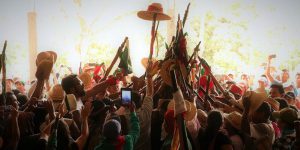Since March 12 in Colombia, there has been a very strong mobilization in the Cauca region (echoed in other parts of the country) driven by indigenous and social organizations: the Minga.
Minga is an ancient indigenous tradition of community or collective work for social utility purposes. The Indigenous people of Cauca have applied the ancestral sense of Minga as a collective work to the modern sense of collective action as an expression of a social movement.
So the Minga in Cauca began by the complaint of the organizations of the humanitarian crisis, and of non-guarantee and respect for their civil, political, economic, social, cultural, collective and environmental rights
Although the constitutional court established that, through the prior consultation mechanism, indigenous peoples can participate in decisions affecting their territories, the measure is not implemented and communities have no voice in projects such as mining and fracking that are ahead In the regions.
Another point that communities put on the table is the care and protection of the environment since the government gives the land to the multinationals to exploit gold, oxygen, forests, biodiversity and mother earth. The indigenous authorities also demand that the government respect the agreed agreement in Havana with the FARC and that the talks with the ELN, presented in several municipalities of Cauca, Be Resumed.
Equally important is the issue of the murdered social leaders, the constant threats, displacements, confinements, and the factors and actors of the war in Colombia. The communities are asking the government for a clear response to the issue of land restitution – which is one of the causes of the assassination of leaders – and actions that mitigate the violence in the territory.
The mobilized organizations ask Duke to come to the territory to dialogue with them. But due to its rejection, communities decided to block the Pan-American via central of the Cauca region until the President’s visit.
The tensions became stronger, and the repression was very hard.
So on March 16, the burned more of the camps and took implements of the protesters.
On March 21, a burst of unknown origin was recorded in the afternoon in the municipality of dagua (Valle del Cauca), leaving 8 people dead and 15 wounds, four of them serious.
The National Government and the leaders of the indigenous Minga in Cauca would have reached an agreement to lift the blockades. But Duke has not come to visit the Minga yet.
________________________________________________________________________________________________________________________________
For a further summary of the situation:



